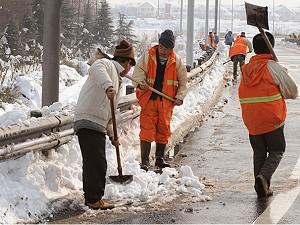GUANGZHOU, China–Millions of Chinese faced a humanitarian crisis on Friday, as petrol and food reserves dwindled and yet more bad weather was forecast for a country paralysed by record-breaking cold and snow.
More than 160 counties and cities in central China were suffering blackouts and water shortages, Xinhua news agency said, including Chenzhou, in Hunan province, a city of 4 million that has been without power and water for more than a week.
“Many trees are severed and power lines have collapsed. It’s like we have experienced an air raid or lost a battle,” a Chenzhou hotel worker told Reuters by telephone. “It is a complete mess. We are hungry and cold.”
Some 250,000 troops had been mobilised as of Friday to help with disaster relief, Xinhua said, as millions geared up for a cold, dark start to the Chinese New Year next week.
Stricken areas of south and central China are suffering the worst winter weather in half a century with snow falling again on Friday.
Miners are working overtime and coal has been given priority to speed through the rail network as Beijing fights the country’s most serious power crisis ever.
“Ice on power cables is so thick that it is impossible for the power cables to carry their weight and power pylons have collapsed,” Zhu Hongren, an official with the National Development and Reform Commission (NDRC), told a news conference.
State television said Chenzhou’s petrol reserves could only run for another seven days and its rice could feed residents for another five days.
Cooking oil and vegetables were also running out, with prices surging. Residents were relying on fire engines for rationed drinking water, it said.
In hard-hit Guizhou province, prices of petrol and candles have quadrupled with the country already facing its highest inflation in more than a decade.
The NDRC issued a notice urging its local bureaux to guard against price gouging and the Ministry of Communications said trucks carrying farm goods would be exempt from highway tolls until March 1.
Zhu said the disaster had taken an economic toll, but added that “underlying fundamentals” were still sound.
“If we take a long-term view, such a disaster will be a temporary one, and therefore its impact on the economy will be short-term,” he said.
But Hunan, Guizhou and Jiangxi were all facing fresh storms, and Zhu said the extreme weather could last another 10 days.
“It is still snowing, no one knows when power and transport might resume,” said a Guizhou resident surnamed Li.
Trains Creak to Life
Nearly 6 million passengers have been stranded on trains or in railway stations in the past week. On Friday, the railways were creaking back into action, but hundreds of thousands of travellers were still scrambling to board trains.
The key line between Beijing and Guangzhou had been restored, the government said, in part by using diesel locomotives to get through areas hit by power shortages.
But with transport lines still choked around the country, the State Food and Drug Administration said it was working to ensure shortages were averted and warned of possible health risks.
“We still have masses at train stations, bus stations, at airports and in crowded areas where perhaps some kinds of intestinal infectious disease could break out,” Yan Jiangying, the watchdog’s spokeswoman, told a news conference.
In Guangzhou, travellers needed luck as well as a ticket.
“It’s not looking good. This is like if you prepare dinner for two and 200 people show up,” said Hu Lin, an environmental assessment official from Hubei province.
Others had given up hope of spending the holiday with family.
“The central government actually cares a lot about us migrant workers, but there is just nothing anyone can do about this worsening weather,” said construction worker Lu Tingjie, who abandoned plans to return to Sichuan to see his children.



Friends Read Free